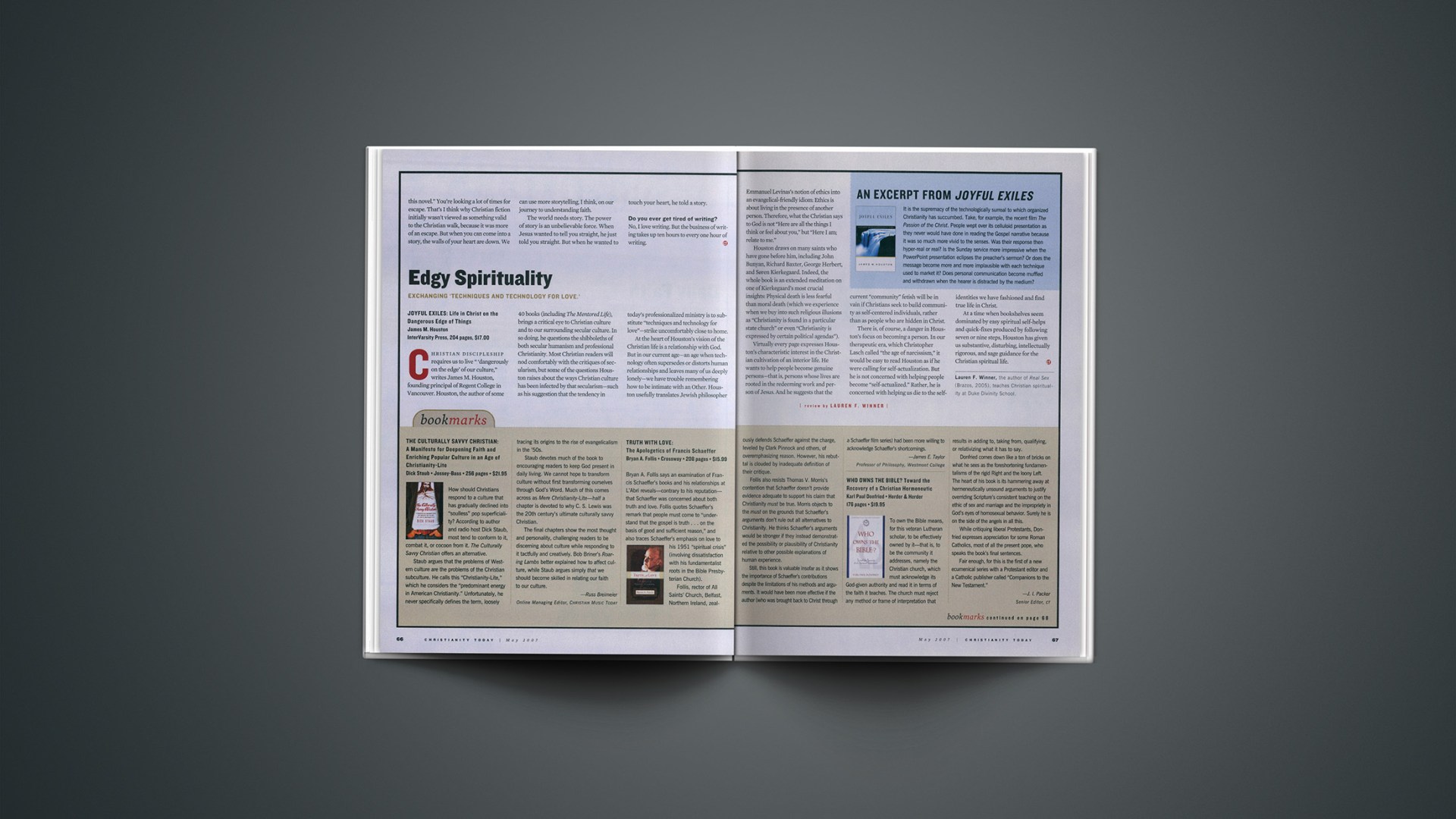Joyful Exiles: Life in Christ on the Dangerous Edge of Things James M. Houston InterVarsity Press, 204 pages, $17.00
Christian discipleship requires us to live ” ‘dangerously on the edge’ of our culture,” writes James M. Houston, founding principal of Regent College in Vancouver. Houston, the author of some 40 books (including The Mentored Life), brings a critical eye to Christian culture and to our surrounding secular culture. In so doing, he questions the shibboleths of both secular humanism and professional Christianity. Most Christian readers will nod comfortably with the critiques of secularism, but some of the questions Houston raises about the ways Christian culture has been infected by that secularism—such as his suggestion that the tendency in today’s professionalized ministry is to substitute “techniques and technology for love”—strike uncomfortably close to home.
At the heart of Houston’s vision of the Christian life is a relationship with God. But in our current age—an age when technology often supersedes or distorts human relationships and leaves many of us deeply lonely—we have trouble remembering how to be intimate with an Other. Houston usefully translates Jewish philosopher Emmanuel Levinas’s notion of ethics into an evangelical-friendly idiom: Ethics is about living in the presence of another person. Therefore, what the Christian says to God is not “Here are all the things I think or feel about you,” but “Here I am; relate to me.”
Houston draws on many saints who have gone before him, including John Bunyan, Richard Baxter, George Herbert, and Søren Kierkegaard. Indeed, the whole book is an extended meditation on one of Kierkegaard’s most crucial insights: Physical death is less fearful than moral death (which we experience when we buy into such religious illusions as “Christianity is found in a particular state church” or even “Christianity is expressed by certain political agendas”).
Virtually every page expresses Houston’s characteristic interest in the Christian cultivation of an interior life. He wants to help people become genuine persons—that is, persons whose lives are rooted in the redeeming work and person of Jesus. And he suggests that the current “community” fetish will be in vain if Christians seek to build community as self-centered individuals, rather than as people who are hidden in Christ.
There is, of course, a danger in Houston’s focus on becoming a person. In our therapeutic era, which Christopher Lasch called “the age of narcissism,” it would be easy to read Houston as if he were calling for self-actualization. But he is not concerned with helping people become “self-actualized.” Rather, he is concerned with helping us die to the self-identities we have fashioned and find true life in Christ.
At a time when bookshelves seem dominated by easy spiritual self-helps and quick-fixes produced by following seven or nine steps, Houston has given us substantive, disturbing, intellectually rigorous, and sage guidance for the Christian spiritual life.
Lauren F. Winner, the author of Real Sex (Brazos, 2005), teaches Christian spirituality at Duke Divinity School.
An Excerpt from Joyful Exiles
It is the supremacy of the technologically surreal to which organized Christianity has succumbed. Take, for example, the recent film The Passion of the Christ. People wept over its celluloid presentation as they never would have done in reading the Gospel narrative because it was so much more vivid to the senses. Was their response then hyper-real or real? Is the Sunday service more impressive when the PowerPoint presentation eclipses the preacher’s sermon? Or does the message become more and more implausible with each technique used to market it? Does personal communication become muffled and withdrawn when the hearer is distracted by the medium?
Copyright © 2007 Christianity Today. Click for reprint information.
Related Elsewhere:
Joyful Exiles is available from ChristianBook.com and other retailers.
The preface and prologue are available at InterVarsity Press.
James M. Houston is one of Regent College’s board of govenors professors.










